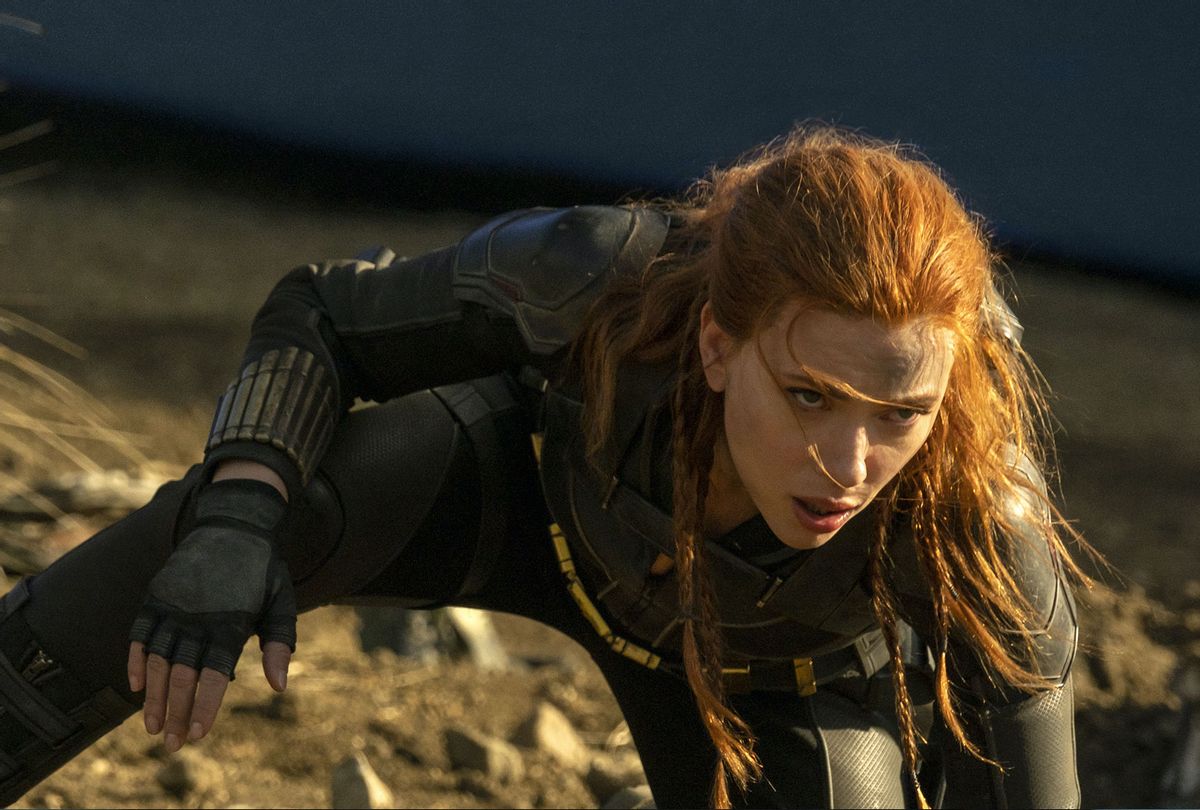As most adult women can attest to, catcalling and hypersexualization begin young. And whether it's catcalling in the streets or generally objectifying comments from men, you're supposed to take this as a compliment, lest you be written off as "no fun" if you don't. It's a relatable struggle for all women — including Scarlett Johansson, who ranked among the highest paid actresses in 2019.
Promoting her upcoming movie "Black Widow," Johansson talked with reporters about the arc of her widely beloved character Natasha Romanoff, or Black Widow. Johansson offers pointed criticisms of the early hypersexualization of Natasha — most notably in Natasha's entrance into the Marvel Cinematic Universe in "Iron Man 2." But she also expresses appreciation for the growth in how Natasha is written and portrayed over time, which Johansson suggests ran parallel to her own growth as a woman.
"Obviously, 10 years have passed and things have happened and I have a much different, more evolved understanding of myself," Johansson told HelloBeautiful.com "As a woman, I'm in a different place in my life, you know?"
She continued:
All of that is related to that move away from the kind of hyper-sexualization of this character and, I mean, you look back at 'Iron Man 2' and while it was really fun and had a lot of great moments in it, the character is so sexualized, you know? Really talked about like she's a piece of something, like a possession or a thing or whatever — like a piece of ass, really. And Tony even refers to her as something like that at one point.
In the line Johansson is referring to, Tony Stark (Robert Downey, Jr.), referring to Romanoff, says, "I want one."
"At one point [Tony] calls her a piece of meat and maybe at that time that actually felt like a compliment," Johansson recalls. "Because my thinking was different. Maybe I even would have, you know, my own self-worth was probably measured against that type of comment or, like a lot of young women, you come into your own and you understand your own self-worth."
In a society that's always assigned women's value and worthiness by how conventionally attractive they are in the eyes of straight men, women and especially young women are often forced to internalize the idea that gross, objectifying comments from men are a compliment, or a reflection of how attractive you are. But Johansson is right — times are changing, and have certainly changed since the filming of "Iron Man 2" more than a decade ago. (Tony Stark himself undergoes plenty of change between his second movie and "Avengers: Endgame," which sees him as a devoted father and husband.)
"Now people, young girls, are getting a much more positive message, but it's been incredible to be a part of that shift and be able to come out the other side and be a part of that old story, but also progress. Evolve. I think it's pretty cool," Johansson said.
It's because of these changes in how we tell women's stories, and the new ways women are being encouraged to value themselves, that Johansson said she's "actually very thankful that ['Black Widow' is] happening now."
"We can actually make a movie that's about real stuff, and audiences want that," she told HelloBeautiful. "I think they always wanted that. Now the studio's kind of caught up to that, which is fine. It's all good. Better late than never. This movie became more of a reality, I guess, when we were shooting Infinity War, so I did know about the character's fate."
Black Widow's sexuality is certainly a valuable asset to the character, and men who underestimate her frequently pay the price. But Natasha Romanoff arguably becomes even more and more interesting with time, from the vulnerability she begins to show in "Captain America: The Winter Soldier" as the discovery of Hydra's role in SHIELD makes her question who she's really been serving; to her role as a compassionate mentor to Elizabeth Olsen's Wanda Maximoff in "Captain America: Civil War"; to her ultimate sacrifice in "Avengers: Endgame."
In each of these more recent movies featuring Johansson as Black Widow, we see her character given more and more depth, and become more than the hypersexualized secret agent we first meet in "Iron Man 2." "Black Widow" offers an exciting chance for Marvel fans to wade even deeper into Natasha Romanoff's character and origin story.
"Black Widow" releases in theaters and on Disney+ on Friday, July 9.
[CORRECTION: A previous version of this article incorrectly credited the outlet that had asked the question in which Johansson referred to the sexualization of Black Widow. This story has been updated.]



Shares